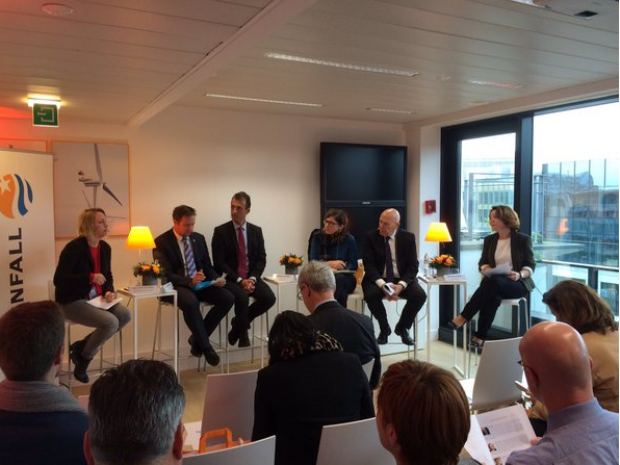“100 % Renewables – Truth or Dare”
Discussion details

“100 % Renewables – Truth or Dare”
On 17 November, Ulf Bjornholm, Head of the UNEP Liaison Office to the EU, took part in the pre-COP21 lunchtime event in Brusselso rganized by Swedish Energy giant Vattenfall.
The event kicked off with introductions by Vattenfall’s Head of Strategic Development, Mr Andreas Regnell, and the company’s CEO Mr Magnus Hall, who outlined the existing energy capacity and demand challenges in Sweden, and explained how they see the transition to a resource efficient energy production, through a shift towards renewable energy. The company is convinced that it is possible to put in place a fully renewables-based system in Sweden BY 2050.
In his presentation Mr Jos Delbeke, European Commission Director-General of DG CLIMA, explained the stakes and opportunities at the Paris COP in December which offers a process to curb the rise of global GHG emissions. He welcomed the success of INDCs submitted by 161 countries, with more than 90% of CO2 emissions covered, even if not reaching the agreed target of limiting global temperature increase to 2 degrees Celsius, and advocated for carbon pricing, for global cumulative investments in the power sector, and for common rules on data to make sure we apply comparable data. Amongst others, he underlined the need for a global transition to renewable energy which is taking place in Europe thanks to inter alia policy, technology innovation and structural reform.
The presentations were followed by a debate during which Ms Jytte Guteland, Member of the European Parliament, underlined the success of the European Emissions Trading Scheme (ETS) to be revised in 2016, and Mr Delbeke announced a new EC proposal next year on a European electricity market.
Mr Bjornholm welcomed Vattenfall’s vision of a 100% renewable energy Sweden from a global perspective. “In the environment debate there is a lot of doom and gloom, but we need inspirational initiatives such as these, whether in Sweden or in the EU or in China etc.” Successful examples will inspire others and incite them to take similar action.
Ms Imke Luebekke, Head of Unit, EU Climate and Energy Policy at WWF, emphasized the need to shut down nuclear energy plants, and free up capacity for renewables. She also underlined the importance of governance to enable the energy transition.
All speakers agreed that we are seeing significant new developments on renewable energy that will shape the future electricity market, and that governance is key. In this respect, Mr Bjornholm added that on climate change and finances, we should go beyond the traditional approaches such as ETS with taxes and subsidies, and consider the financial system as a whole. "We need to look at financial regulations and institutions where the trillions are.” He referred to the UNEP initiative called "Inquiry into the Design of a Sustainable Financial System" which presented its final report in October: http://web.unep.org/inquiry. This includes a set of inspiring examples from both developing and developed countries on how to align the financial system with sustainable development.
Finally, he underscored that on the capacity issue, European solutions will create a competiveness opportunity, as we can expect a high demand by other countries worldwide.
Log in with your EU Login account to post or comment on the platform.